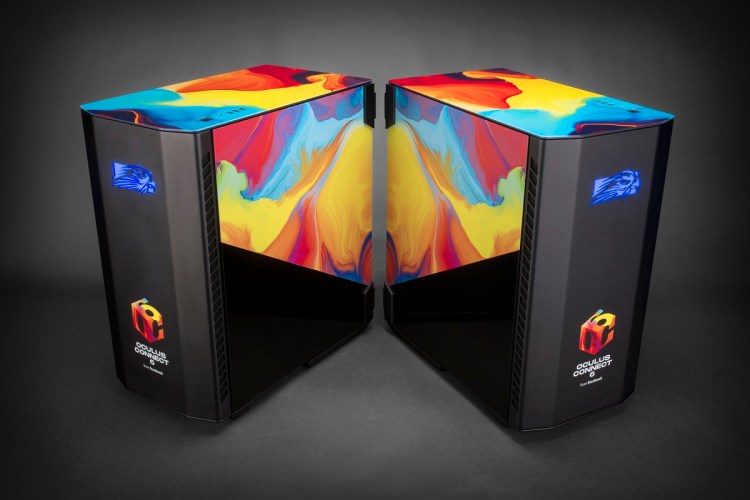Custom gaming PCs have always seemed like toys of the rich or geeky hobbyists. But you’d be surprised at the kind of people who talk to Kelt Reeves, CEO of Falcon Northwest, about creating the ultimate gaming machine.
Reeves has been running Falcon Northwest in Medford, Oregon, since before he got out of college in 1992. Back then, gaming rigs meant creating machines for flight simulator enthusiasts who needed joysticks and throttles to control their virtual aircraft. Now it has become a whole sector of the PC gaming business, including everything such as high-end gaming laptops and machines with multiple graphics cards and processors with dozens of cores.
Reeves saw competitor Voodoo get scooped up by HP and Alienware get acquired by Dell, but Falcon Northwest has remained independent. It has 25 employees, but still caters to the crowd that wants a one-of-a-kind machine.
I caught up with Reeves at the Oculus Connect 6 event in San Jose, California, where Facebook was using his computers to show off Oculus Link titles on the Oculus Quest virtual reality headset.
June 5th: The AI Audit in NYC
Join us next week in NYC to engage with top executive leaders, delving into strategies for auditing AI models to ensure fairness, optimal performance, and ethical compliance across diverse organizations. Secure your attendance for this exclusive invite-only event.
Here’s an edited transcript of our interview.
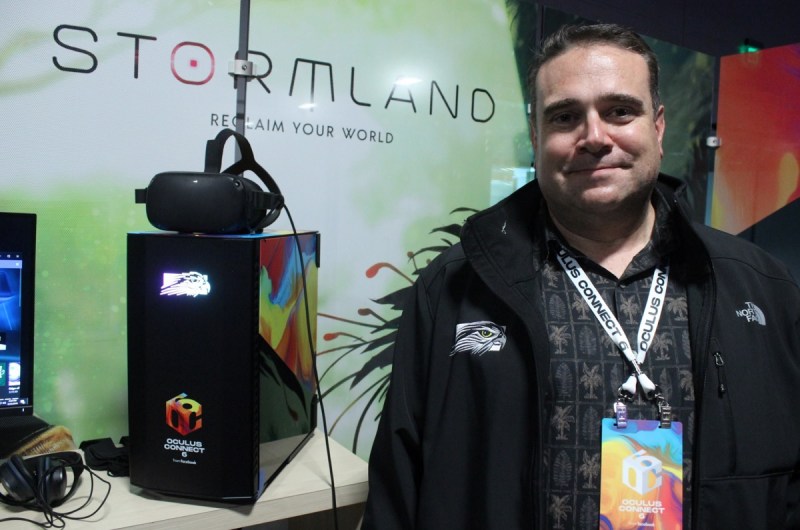
Above: Kelt Reeves is founder of Falcon Northwest.
Kelt Reeves: Back when I started, there was no gaming PC market. I got out of college in 1992 and I started the business before I got out of college. I was making PCs for people who played Microsoft Flight Simulator at the flight school I went to. Back then there wasn’t a PC made for games. I refer to that as the one good idea I ever had. I’d been reading Computer Gaming World for years, and it was all game ads in there, but no one ever advertised a PC, which everyone was playing on.
GamesBeat: Did you make flight yokes and throttles, that sort of stuff?
Reeves: Absolutely. That was necessary for the flight sim crowd. But for the first five years, we ran unopposed. Nobody else thought it was a worthwhile market. We were just hacking trail with a machete. People were kind of ashamed, in the early ‘90s, to admit that they used their business PC to goof off and play games. It was all phone sales back then. This was pre-internet. People called us up and said, “I’m ashamed to admit, but mainly I use my PC to have fun.” That’s what this company was about.
It wasn’t until 1997 or so that we had our first competitor, the first one that actually lived. That was Alienware.
GamesBeat: When Voodoo came along.
Reeves: Yep! And both of those were swallowed and eaten at this point.
GamesBeat: Voodoo completely vanished, but Alienware is still doing well for Dell, I guess.
Reeves: What’s funny is their new one — I refer to it as the Dyson air cleaner. Have you seen it? It looks just like a Dyson. [laughs] Someone did a deep dive on the backstory for it, and they showed this thing just completely, 100 percent, wrapped in prototyping plastic. It got me thinking. How much plastic do we use in the Talon, the system I developed myself? In general, if I can use metal, I’d much rather use metal. I took it all out and it literally fit in my hand, all the plastic we used in the Talon.
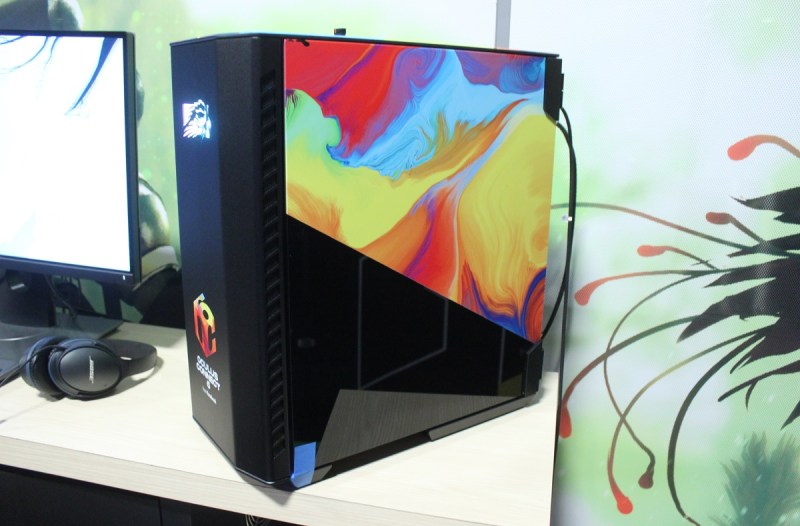
Above: Falcon Northwest’s Talon machine had no trouble running Stormland over an Oculus Link to an Oculus Quest.
GamesBeat: How did you figure out gamer tastes, what they really wanted from their machines?
Reeves: Back in the early days it was trying to figure out what hardware ran the games fastest. One of the demos we were doing at Comdex in 1995 was we were showing off Wing Commander III, which stopped people in the aisles, because it had FMV off a CD-ROM. We showed how with our dedicated joystick ports, we could run the game at 30 frames per second, whereas if you ran off a standard motherboard port, you were limited to 24 just from the poling.
Nowadays you have so many people addressing the market that it’s an embarrassment of riches. You have Nvidia versus AMD, and now finally AMD versus Intel. For many years we were an Intel shop, and for many years we became an AMD shop. It’s really just recommending the parts that are going to work best for games.
AMD’s resurgence in gaming processors
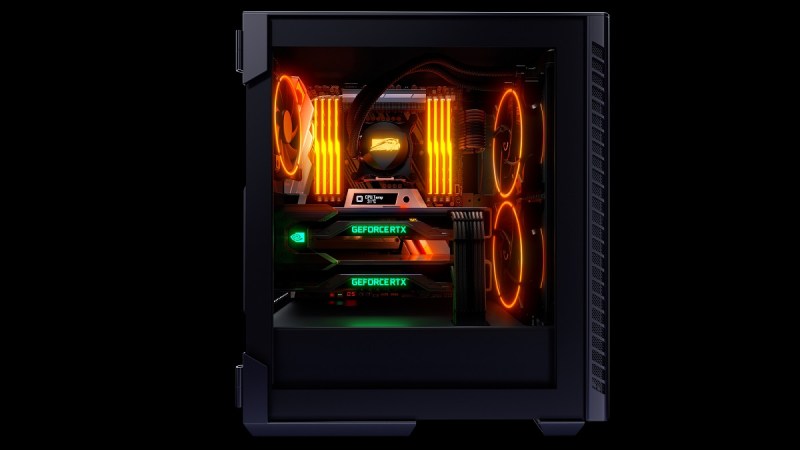
Above: This Falcon Northwest Talon has serious graphics horsepower.
GamesBeat: Was there ever a time where you had much AMD stuff? Was that the Athlon era?
Reeves: Oh, yeah. Athlon FX. We were majority AMD in the early 2000s. Then Intel fought back with their Core 2 Duo, which got their power requirements down.
GamesBeat: Intel didn’t lose your allocation of chips anywhere?
Reeves: You know, there’s a funny story about that. [Laughs] We did get one cease and desist letter. Back in the old days, Intel was deathly afraid of overclocking. As far as we know, the earliest all-in-one liquid cooler was actually developed by Intel. We got a call from an engineer one day and he said we could help him save this project.
He brought it down and it was amazing. It was the first fully sealed, all-in-one liquid cooler. We became their first customer for it. They had a warehouse full of them that they didn’t know what to do with. They were just going to scrap it all. They were marked “Sanyo Denki.” We had to modify our cases specifically to carry them. But we were kicking butt at the overclocking competitions.
Intel was not a fan of overclocking back then. Nowadays they run overclocking workshops. It’s a very different market now. The hardcore gamer is a much more prioritized segment of the market. They saved Intel’s butt when they weren’t doing well.
GamesBeat: How much has AMD taken back now?
Reeves: They’re slowly gaining. These new Talons we sent out, the new 3900X, are the first new AMD review units that I think we’ve sent out in 15 years. It’s been a long time coming. Even then, they’re very close to a 9900K.
It’s really kind of a toss-up. It’s a little bit slower on the game performance, but anything that’s heavily multi-threaded, or if you have a lot of windows open, or if you do photo editing or video editing, you’ll appreciate those 12 cores. I’m not sure if you’ve seen the two-drive SSD setup to show you what PCI Express 4.0 can do, but that’s just an incredible amount of throughput for storage. It’s more future potential.
How many threads do gamers need?

Above: Falcon Northwest has been making gamer PCs since before 1992.
GamesBeat: What are you finding about the threads, 16 or 32? Does that matter for particular features in games?
Reeves: For games, not so much. I always say that Windows itself is the killer app for multi-core. I don’t know if you’re like me and you have 27 windows open all the time. Being able to have the game have all the cores it wants, usually that’s not more than four. But who would have thought a browser could eat so much? They do! It’s just amazing.
Realistically, the core wars are on. That was one of the reasons why, for the new Talon, we ended our — well, not ended, but temporarily went sold out on our full tower Mach V systems. We think it’s the longest running PC name of any type. It depends on whether you consider Mac or iMac the same system. But for PCs, the Mach V is the longest running brand name. People bought that because it was the highest end for the longest time.
The thing is, it’s a full tower. Honestly, nobody needs a full tower anymore. There’s just not enough to put in there. The system we sent you has two M.2 slots in it. You can put two 2TB NVME drives in there. You can have 4TB without using a drive bay. Our little four-inch-wide Tiki systems we’re hiding in the cabinets here, they can have 20TB of storage in there.
The new Talon is designed to cool for the coming core wars. Intel is going to fight back in a big way. “Hey, look how many cores we have!” The thermal design powers are going up and up and up on those. Frankly, the 280mm cooler in there, it’s as big as a Tiki.
Laptops or desktops?

Above: Blue lighting on a Falcon Northwest machine with a single graphics card.
GamesBeat: For the desktop market, is that as big as ever, or have all these powerful laptops eaten into the gamer side of things?
Reeves: We do laptops as well. It’s always been a small percentage of our market, but it’s definitely been climbing since Nvidia released the Max-Q design. The laptop graphics aren’t equal yet, but they’re in striking range of their desktop counterparts. It’s not an apples and oranges scenario anymore.
They still do better when they’re plugged into power. The laptops we sell, if a regular business customer comes to us saying, “I want our corporate logo on it, and I want 10 hours of battery life on long flights,” we’re like, “Uh, we make gaming laptops.”
GamesBeat: What are the usual price points for yours?
Reeves: In general, once you get below $2,000, that’s Dell and HP’s territory. We don’t even try to compete there. The range above that kind of goes unlimited. Our average price point is just south of $5,000. We don’t really push that configuration, but that’s what people come to us for.
Custom cases

Above: Plastic parts used in a Falcon Northwest machine.
GamesBeat: The cases and the hand-painting, is that a big part of it? Or is it just packing the machine full.
Reeves: Oh, no. The print you got, very simple, very easy to do. But obviously the cases are very expensive. We’ve plated that with all 4mm aluminum, not because it was necessary, but because nobody else was doing it. [Laughs] I don’t like to use plastic. I like to overbuild when possible. We’ve always been the anti-Dell, the alternative to the mass-market PCs.
GamesBeat: How many people do you have working for you?
Reeves: Just 25. We’re a small shop.
GamesBeat: How have you stayed small while everybody else went giant?
Reeves: I guess nobody offered me a big enough check. [laughs] I never got my big Dell or HP buyout. We’d had seen what had happened to both — with Voodoo it was very quick. HP came in, fired everybody, closed the place in Canada. It was pretty obvious that one or two guys made out on that. Basically killed the brand.
Alienware, they took them in a very different, mass-market direction, but that was actually nice for us, because they were less competition the bigger they got. They were successful doing what they were doing.
GamesBeat: I saw that Frank Azor finally left Dell/Alienware to go to AMD.
Reeves: And that’s weird, because he’s their enthusiast guy. He’s going to be calling me now, trying to get me to send you an AMD system. That’s going to be a very strange phone call when I get it. That and of course all my AMD contacts went to Intel. A lot of my Nvidia contacts went to Intel. They’re sucking up graphics people left and right.
GamesBeat: Interesting. Do you have a prediction there, how everything will shake out?
Reeves: I haven’t seen anything from Intel yet. Obviously everybody would welcome another player in the market. Nvidia is fantastic. They’re great to work with. But honestly I think they’re better when they have competition nipping at their heels. It keeps them on their toes.
GamesBeat: They seem to be throwing all the resources into AI. They’re veering off the graphics path.
Reeves: That said, every time their financials come out, there’s that very strong gamer segment.
GamesBeat: They’re spending the money on AI and making the money on games.
Reeves: They still deal with us directly, right to the top. Jensen and Fisher are fantastic. We can still talk to them. We knew them when they were small. We were actually around before they were. They’re nice enough to still talk to the boutiques directly, which frankly a lot of companies don’t.
It’s interesting to look at the people Intel is hiring. I remember at an AMD even a couple of years ago, Ryan Shrout from PC Perspective was interviewing Raja Koduri, who was head of their graphics. Both of those guys now work for Intel. Silicon Valley, man, it’s very strange.
Custom versus mainstream gaming PCs
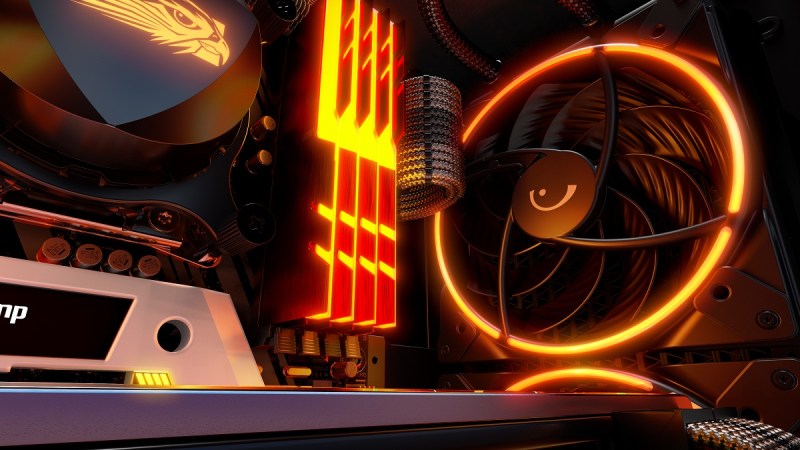
Above: Falcon Northwest
GamesBeat: Do you think PC gaming will stay with the high-end custom machine? How many people are satisfied with more mainstream gaming products?
Reeves: Boutiques are always going to be here. That’s the whole point. We’re that tiny part of the market for the customers who’ve been through the regular PCs and want something more. The nicest compliments we ever get are from former DIY guys. “I used to build my own system. Now I work 50 hours a week. The money is no problem, but I don’t have the time or the patience to deal with all the problems with building and supporting myself. I want somebody else to handle it.” When those guys say, “Hey, you built this and cabled this better than I could have done myself,” that means a lot to us. Those guys know how difficult it is. It’s hard for them to admit something like that sometimes.
GamesBeat: Gamer dads!
Reeves: [Laughs] We’re starting to see that second generation now, too. I’m getting old enough, 27 years at this now. We’re starting to see people say, “I’m getting my kid into PC gaming now.” It’s fantastic.
I convinced my parents in college that my Apple IIe wasn’t cutting it for my schoolwork anymore, but the reality was that Ultima IV had come out with VGA graphics. I went PC. It’s a good thing my aviation career had a fallback in goofing off playing video games, because nobody needs pilots now. [laughs] My aeronautical science degree comes in handy when I use checklists for quality control, though.
GamesBeat: You never expected to go down this path, then?
Reeves: No. What was funny, though, for the first couple of years running the business — I knew nothing about running my own business. I referred to myself as an out-of-work pilot.
GamesBeat: Did you ever get much into the millionaires in Dubai sort of market? “Hey, those $10,000 machines, I’ll take 10 of those.”
Reeves: Less than there used to be, but there’s a buyer in Miami who would basically assemble the stuff that the sheiks wanted and container it over. Before Tunisia fell apart, we sent an awful lot of systems to the embassy of Tunisia. [Laughs]
These days, honestly, the customers that I enjoy having the most are the guys like Carmack and Gabe Newell and Chris Roberts, the game gods that I respect most. The kind of thing where — can I save Carmack’s tweet? [laughs] For those in the know, that’s what always puts a smile on my face. Serving that clientele makes me a happy camper.
I’ve got my bucket list. Tim Sweeney is another one. He told us he likes our website. I’m like, “Yes, I impressed Tim Sweeney with something!” Bucket list achieved.
